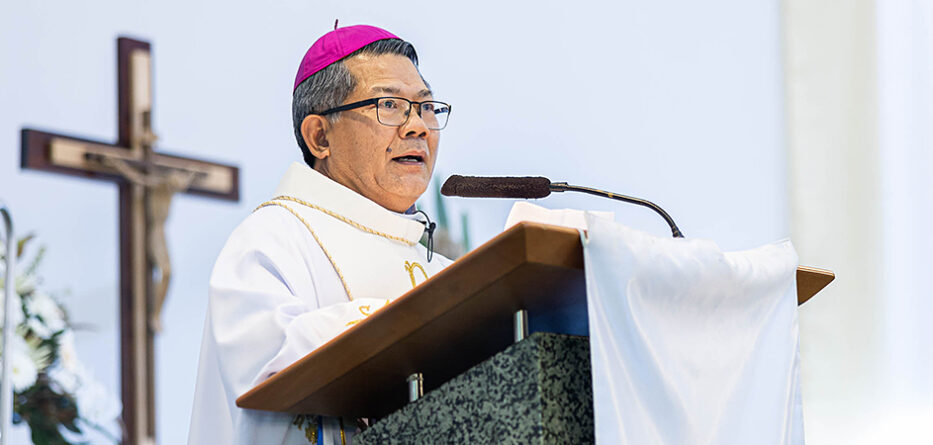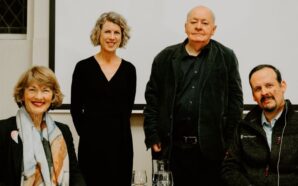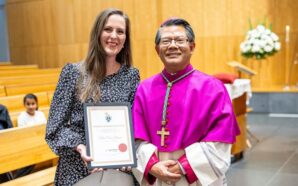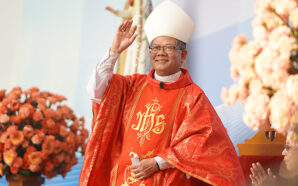Most Reverend Vincent Long Van Nguyen OFM Conv DD STL, Bishop of Parramatta
Homily for the Solemnity of the Most Holy Trinity, Year B and the 50th anniversary celebrations at Our Lady of the Way Parish, Emu Plains.
Readings: Deuteronomy 4:32-34, 39-40; Psalm 32(33):4-6, 9, 18-20, 22; Romans 8:14-17; Matthew 28:16-20
26 May 2024
Resetting the Church with the Trinitarian model
Dear brothers and sisters,
It is with joy and a tinge of nostalgia, but above all gratitude that we have come together to celebrate the Golden Jubilee of our beloved parish here at Our Lady of the Way. 50 years ago, Fr Kevin Hannan together with the parishioners started a fledgling community in humble circumstances. As they say, “God helps those who help themselves”. That was exactly what they did. Boy, didn’t they do it tough? The first Sunday collection was stolen by a thief. When they had saved up enough money to buy the land, the owner refused to sell it to the Church. But unbeknownst to him, the parish had deputised a parishioner to bid on its behalf and the price he ended up paying was lower than what the owner had been offered by the Church. We will not call it “divine retribution”. He was just outsmarted by very determined parishioners. We thank them for a magnificent legacy in terms of a great physical infrastructure as well as a cohesive, generous and supportive Christian community. We honour their memory by adding to the rich tapestry of faith, education and outreach. As the African saying goes, “we sit on the old mat in order to weave the new mat”, we endeavour to become the living testament of the Gospel.
Today is the Solemnity of the Holy Trinity. God is revealed to us as we are moved to become a community that reflects the God of love among all peoples and the God of relational unity with all that exists.
In the Old Testament, there is a strong emphasis on the greatness of the one God that Jews worshipped as opposed to the worship of multiple gods in the other cultures of the Ancient Near East. Yet the greatness does not mean God is siloed, removed and aloof from humanity. Rather, God is closely bonded with His people throughout the ebbs and flows of history. Thus, in the first reading, Moses reminds the Israelites of the purpose by which God has delivered them from their bondage in Egypt. God has accompanied them on a journey to freedom, “by ordeals, signs, wonders, war with mighty hand and outstretched arm and by fearsome terrors.” Now in the time of stability and prosperity, they must not be dulled by amnesia. Moses instructs the Israelites to get on with the task of building a post-Exodus society, which would reflect the God of communion and love. The covenant community would be marked by concern for the God-given dignity of all and special attention to the most vulnerable, the widows, the orphans and the strangers.
Moses’ instruction to the Israelites finds resonance in the Gospel. The risen Christ commissions the Eleven to transform the world with the Good News. “Go, therefore, make disciples of all the nations, baptise them… and teach them to observe all the commands I gave you.” This is a command not to conquer and dominate, not to assimilate and proselytise. Christendom, and for the most part of Christian history, we have tried to be great, powerful and dominant. Rather, our mandate is to be a critical yeast and a leaven for total transformation. Our mission is not so much to subjugate others as to share with them the dynamic presence, the living power and energy of the Trinitarian God.
Making disciples of all the nations cannot be other than to imbue the world with the spirit of Jesus. It cannot be other than to make His messianic agenda of healing the sick, binding the wounded, lifting up the lowly and releasing the indebted our own agenda. We Christians cannot live in the world without regard for peace and justice. If we do not make the world a better place than we found it, if we allow ourselves to be indifferent to the suffering world, then we will have forfeited our task of being a changing agent and a leavening force.
Dear sisters and brothers,
In celebrating the Trinity, we are to mirror the relational model of the Trinity that is revealed in Jesus’ style of radical self-emptying love, solidarity, simplicity and unity. In Him, we see a God whose modus operandi is the antithesis of the power structures of this world that is tilted towards the privileged, the rich and the strong.
The Christian way of living cannot be other than the way shown in Jesus’ radical simplicity, solidarity and communion with God’s people and creation.
This week is also “Laudato Si’” week as we mark the ninth anniversary of the prophetic encyclical. Individuals and organisations are invited to achieve the practical goals of ecological living such as adopting renewable energy, reducing our carbon footprint, living a simple lifestyle, showing solidarity with indigenous peoples, protecting all life forms and all stages of human life. This is yet another way of reflecting the Trinity for us. As Pope Francis says, creating the future of a more inclusive, fraternal, peaceful and sustainable world is our mission.
If the Church is to be a source of hope for the future of humanity and the planet, it will have to reset itself in the trinitarian framework of life, love and harmony that is deeply relational and directed towards the periphery. The Trinity is the template for revitalising the Church as a circular, symbiotic and co-operative relational paradigm. This is the synodal way of being Church that we are called to embrace.
Our celebration of the Golden Jubilee is a time of gratitude, trust and joyful hope in the future. We are grateful for what has been achieved. But we are also confident of a hope-filled future knowing that God will bring the triumph of love out of the pain we bear. May we become catalysts for renewal and transformation through our commitment to and engagement with the Gospel values. Let us learn the art of living deeply in God’s love, attentive to his presence and responsive to his call. Then we can truly be the conduit of mercy and the sign of hope for all.








